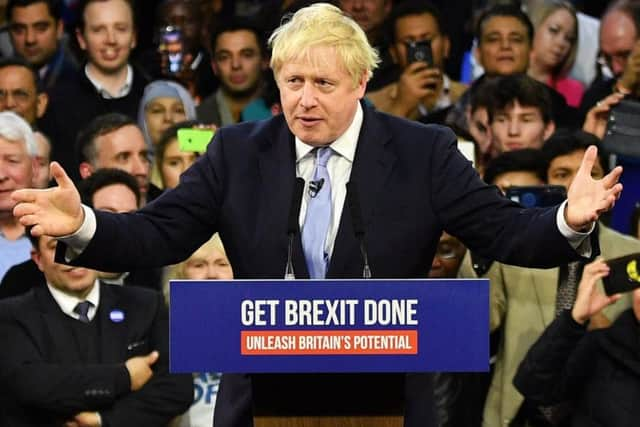'This general election was a pageant of evasion and deception' - Paris Gourtsoyannis
Since moving to London, I’ve acted as a proxy voter for a friend who moved to Europe - someone who’s politically engaged and has probably never missed an election in their life. This week he gave me detailed instructions for how to spoil his ballot.
They can’t be printed in a family newspaper.
No one really wanted this election, and the mood throughout has been one of distrust and disappointment. It was called because the politicians couldn’t compromise, so the people had to.


Advertisement
Hide AdAdvertisement
Hide AdProfessor Sir John Curtice dubbed it ‘unpopularity contest’: to lead the country at the most critical time in modern history, the choice was between the least popular new Prime Minister ever, or the least popular leader of the opposition. Uninspiring options yielded only agonising, grudging decisions.
When I joined the Tory candidate for Stirling on the doorsteps, I heard voters wrestle with their dilemmas out loud, unprompted. “I wanted to stay in the UK and the EU;” “Boris Johnson - what will he do next?” And from someone who voted against Scottish independence: “Why are we Better Together in the UK and not in Europe?”
In many parts of Scotland, if you supported staying in the UK and the UK staying in the EU, you had to choose which union mattered most. But compromise and disappointment didn’t stop at the border.


Brexit Party supporters were told they would trigger a political earthquake; across half the country, there wasn’t even a tremor. Nowhere are the stakes higher than in Northern Ireland, but electoral pacts reduced the options for Unionists and Nationalists, Remainers and Leavers alike.
And everywhere, supporters of both the main parties were forced to question political loyalties stretching back generations.
For every Corbyn partisan, there was a Labour voter feeling betrayed because their party has ignored them over Europe, or even more painfully, because the stain of anti-semitism has become impossible to conceal or ignore.
Equally, Life-long Tories have asked themselves similar questions, wondering whether a party led by Boris Johnson still represents their values.
You heard it in the tone of the challenges from audience members at the live TV debates - rare occasions when party leaders face scrutiny from a crowd they haven’t hand-picked.
Advertisement
Hide AdAdvertisement
Hide AdAfter nine years of austerity and three and a half years on from the EU referendum, the skepticism tipped into cynicism. It’s healthy to laugh at our leaders, but what does it say that the biggest punchline was a Prime Minister saying the truth matters to him?
To cut through the malaise, both parties tore up their fiscal blueprints and promised more spending than they have in generations. On both sides, the pledges should have been popular: tens of thousands of new nurses and police; a publicly-run railway, postal service and utilities.
But many simply refused to believe them. It’s not hard to see why when Labour made a £54bn promise to compensate women hit by the rising retirement age, the day after their manifesto launch, and Johnson floated the scrapping of the TV license - effectively overhauling the funding of the BBC - at a campaign event, conveniently on his most difficult day of the election.
Meanwhile, the SNP put forward spending plans that would be undeliverable in an independent Scotland, while the Liberal Democrats overhyped themselves to the point of ridicule.It simply hardened the impression that politicians are willing to say and do anything to get your vote today, but only answer the questions tomorrow.
An election of evasion
The 24-hour news cycle and our always-on social media culture should mean a new age of transparency, scrutiny and accountability. But this election was a pageant of evasion and deception.
A Prime Minister who wants to open trade talks with Donald Trump refused to be interviewed for 30 minutes by Andrew Neil. Both sides played favourites with the questions they took from journalists and the outlets they appeared on. Frontbenchers have haunted spin rooms and trolled from the sidelines.
The Conservative Party rebranded its twitter feed ‘FactCheckUK’ during the first debate, and paid to have Google search results for the Labour manifesto led by its own attacks - a commentary on its own offering, which abandoned bold promises on tax cuts and social care Johnson made during the Tory leadership campaign.
When events broke through the slogans, memes and s**tposts, like the photo of four-year-old Jack Williment-Barr sleeping on the floor of Leeds General Infirmary, they were drowned out by a tide of misdirection and misinformation - briefings about punches that were never thrown, and conspiracy theories boosted by columnists and candidates.
Advertisement
Hide AdAdvertisement
Hide AdMost worrying of all, both leaders betrayed a disqualifying lack of empathy when it mattered most. Apologies for failures over antisemitism, Islamophobia, and divisive past rhetoric had to be dragged out them.
Easier to drive a JCB through a polystyrene wall. Somehow, as society grows more aware of the power and nuance of words and deeds, our politics become more macho and unaccountable.
New normal
For most of this election, journalists covering the campaign have complained about it being too predictable, almost boring. It’s understandable: we’ve seen the Corbyn Labour playbook before, and Johnson’s message of ‘get Brexit done’ was as strong, stable and inert as two years ago.
But we’ve had technology lessons with Jennifer Arcuri, the continuing storm over anti-semitism, a terrorist tragedy, secret trade documents and claims of Russian hacking, and a Prime Minister asked how many children he has - a question we still don’t have a definitive answer to.
Consider how far the range of what is reasonable has shifted: it was news that the President of the United States didn’t make an unprecedented partisan intervention in British domestic politics.
Polling day
This was the first winter election in half a century, and the first December election in a century.
Going into polling day, experts said as many as 100 seats were too close to call. There were former Tory cabinet ministers standing against their party, ex-Prime Ministers telling voters not to back their side, and outgoing Labour MPs endorsing former rivals. This was a remarkable, unique, unrepeatable campaign.
If it felt like the most important election in a generation didn’t matter, it’s because a now tired lesson was confirmed: you can’t push a binary constitutional issue through the world’s oldest parliamentary democracy.
The machinery is too delicate; things break.
Advertisement
Hide AdAdvertisement
Hide AdIt can only yield more disappointment. Voters won’t have said no to indyref2, and Brexit won’t get done; both of the UK’s most divisive questions will hang over the country into 2020 and beyond.
At least this part was over by Christmas.
